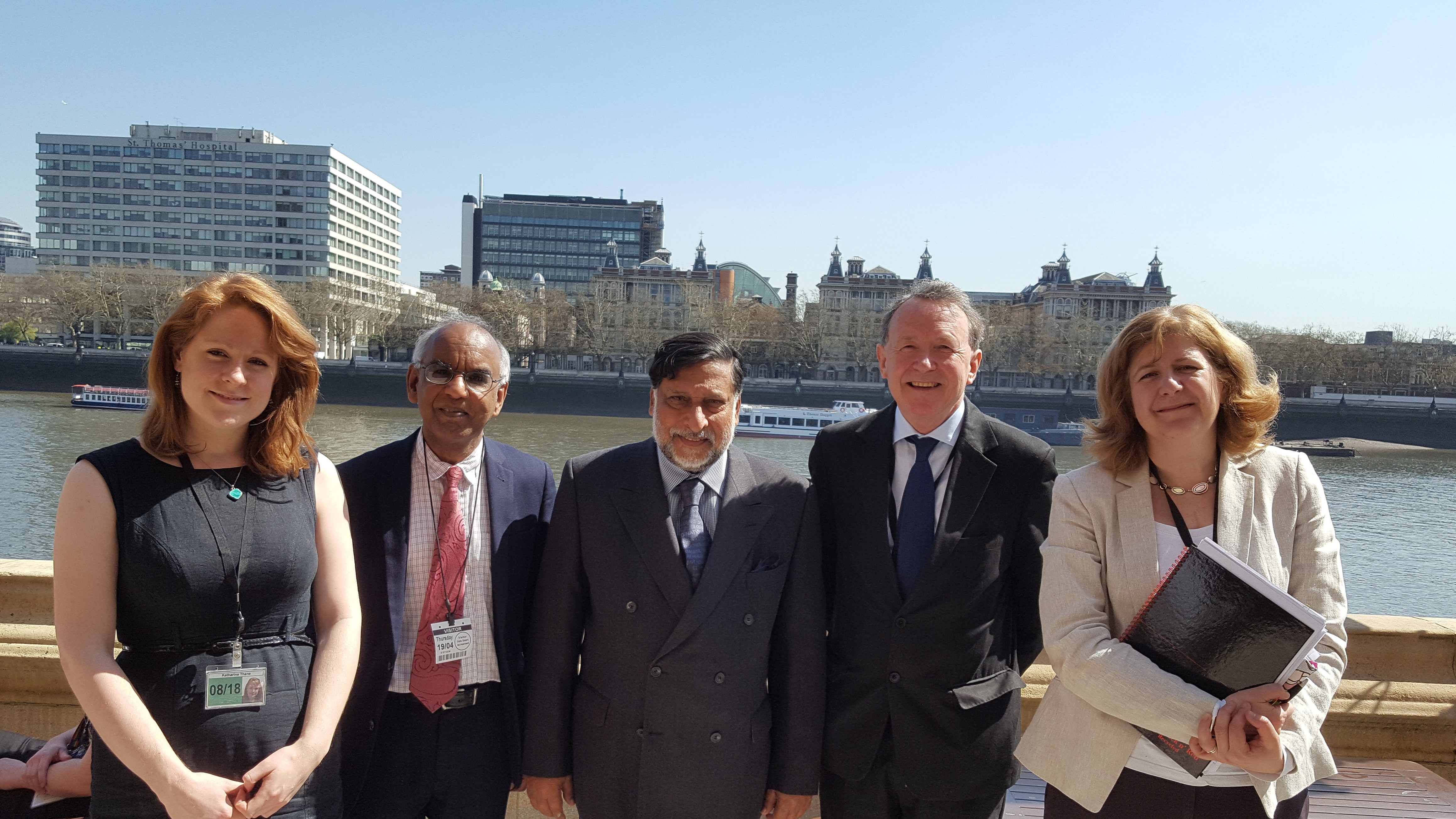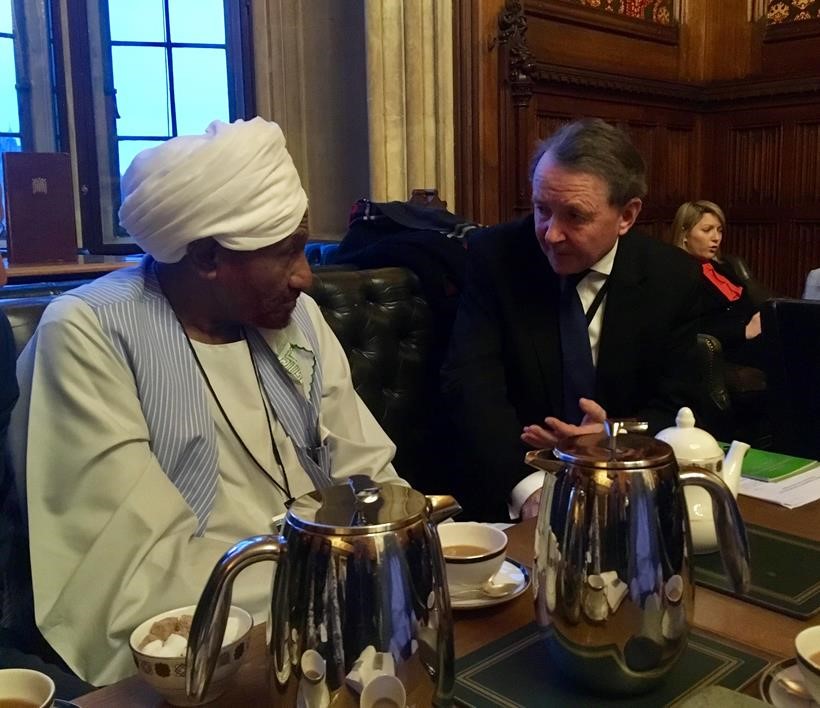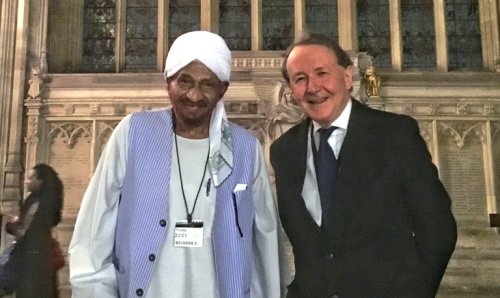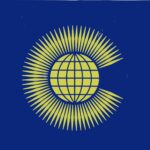Freedom of Religion or Belief In Commonwealth Countries Raised In Parliament and Discussed with Leading Judge From Pakistan

It was wonderful to chair a constructive and very positive meeting this morning (April 19th 2018) with Justice (R) Chowhan, Chairman of the National Commission of the Human Rights in Pakistan – who is in London as part of the Commonwealth Heads of Government meetings. We had wide ranging discussions, particularly about the position of the country’s minorities. A celebrated jurist of considerable experience and distinction Justice Chowhan fielded questions from representatives of all party parliamentary groups, pictured here with me on Westminster’s Terrace of the House of Lords.
=========================================

It was a great pleasure, on behalf of the All Party Parliamentary Group on Sudan and South Sudan, to welcome Imam al-Sadiq al-Mahdi, leader of the Umma Party and Chairperson of the Sudan Call opposition group, to parliament recently. We discussed the peace process following the Sudan Call’s meeting in Paris last month.
You can read more about the meeting on the Sudan Tribune website http://www.sudantribune.com/spip.php?article65001

=======================================
Killings of Christians in Nigeria
Lord Ahmad of Wimbledon, the Foreign and Commonwealth Office, has provided the following answer to your written parliamentary question (HL6858):
Question:
To ask Her Majesty’s Government what assessment they have made of the potential for further Islamist violence in Nigeria following reports of unprovoked attacks on Christian communities in the north of that country, including the murder of two Catholic men on 5 April. (HL6858)
Tabled on: 16 April 2018
Answer:
Lord Ahmad of Wimbledon:
We are concerned by the deaths of two men on 5 April in Kaduna State. The facts of this and all other incidents should be established and perpetrators brought to justice. The UK calls on all parties to find a peaceful solution to the complex underlying causes of these incidents to reduce the potential for further violence.
Date and time of answer: 30 Apr 2018 at 16:48.
ACN News: Monday, 30th April 2018 – NIGERIA
With picture: 0430Nigeria_ Christians in Middle-Belt region (© Aid to the Church in Need)
Bishops: President should resign for inaction over Nigeria’s ‘killing fields and mass graveyard’
By Murcadha O Flaherty and John Pontifex
NIGERIA’S bishops have issued a formal statement calling on the President to “consider stepping aside” and accusing the government of security failures which they blame for the murder of 17 Christians including two priests.
Father Joseph Gor, Father Felix Tyolaha and 15 parishioners were killed during a funeral Mass in Mbalom, Benue State by gunmen, with reports that about 30 Fulani militants waited for the faithful to gather at the church before attacking. They also burned down about 50 homes in the area.
Condemning the “rampaging and murderous terrorists”, the Catholic Bishops Conference of Nigeria (CBCN) issued a formal statement, asking: “…how can the federal government stand back while its security agencies deliberately turn a blind eye to the cries and wails of helpless and armless citizens who remain sitting ducks in their homes, farms, highway and now, even in their sacred places of worship?”
Writing in bold typeface, the bishops stressed: “…it is time for [Nigeria’s President Mudammadu Buhari] to choose the part of honour and consider stepping aside to save the nation from total collapse.”
Accusing the President of ignoring repeated calls to step up security, the bishops assert: “He should no longer continue to preside over the killing fields and mass graveyard that our country has become.”
Written in the wake of the funeral Mass killings, which took place last Tuesday (24th April), the bishops assert that they have lost confidence in the country’s security apparatus.
In their statement, the bishops declare: “Faced with these dark clouds of fear and anxiety, our people are daily being told to defend themselves. But defend themselves with what?”
The statement notes that the “government should encourage and empower citizens to secure themselves and their environments. This is not the time to disarm people with legally procured weapons of self-defence.”
The CBCN statement reports that, back in January, Father Gor, one of the priests killed last Tuesday, had warned about the continuing threat posed by Fulani herdsmen of whom he said: “‘They still go grazing around. No weapons to defend ourselves.’”
Highlighting security concerns across Nigeria’s Middle-Belt, Father Alexander Yeyock, parish priest of St John’s Catholic Church, Asso village in nearby Kaduna State, told Catholic charity Aid to the Church in Need: “The concern now is that the entire nation should not depend so much on national security protection.
“Every individual, groups and community should struggle to defend themselves. This is grossly unfortunate.”
Father Yeyock’s parish was attacked a month ago when two Catholic men were shot dead, an atrocity which took place almost exactly a year after Fulani militants murdered 12 Christians during the Easter Vigil service at his church.
Referring to tension in his parish and across the region, Father Yeyock said: “In Asso, farmers go to farms in fear and in groups… Bereaved families have come to terms with the reality that attacks by Fulani herdsmen, [occur] frequently in Asso, but no place is spared.”
Father Yeyock added: “It’s again unfortunate that the perpetrators of these heinous crimes are known by the government of Nigeria, those who sponsor them too, and yet no action is taken.”
Highlighting that Fulani militants receive military training abroad before going on to target Christians, he said: “With the news of the current attacks, Nigerians have argued with the earlier narrative from the federal government who have very often told the world that it was always a clash between the herdsmen and farmers.
“It’s now evidently revealing that there is more to it than meets the eye… It is purely a religious jihad in disguise.
According to reports, the Acting Governor of Benue State, Benson Abounu, said last Tuesday’s attack showed that the security breakdown had “gone beyond [a] farmers-herders crisis”.
===========================================================================
Freedom of Religion or Belief In Commonwealth Countries
Lord Alton of Liverpool (CB) – Wednesday April 18th 2018
My Lords, has the Minister seen, in advance of this week’s Commonwealth Heads of Government conference meeting in London, that 95% of citizens of the Commonwealth have religious beliefs but that in 70% of Commonwealth countries there is some degree of persecution on the basis of freedom of religion or belief? How is it commensurate with that challenge to have only two desk officers in the Foreign and Commonwealth Office dealing with this issue? How is it commensurate with our obligations under Article 18 of the Universal Declaration of Human Rights, which upholds the right of every citizen to believe, not to believe or to change their belief?
Baroness Stedman-Scott (Government Minister)
I am delighted to hear that more than 90% of people in the Commonwealth have a religious belief; that is excellent. It is disturbing that 70% are unable to express it in the way that we would all want. On the noble Lord’s point about resources, I in no way wish to make light of this, but I cannot think that there is a government department that does not want more resources to do things. I cannot answer his question in as much detail as he would like, but I will go away, find out more information and let him have it. I just put in a plea that resources are tight in the current fiscal climate, but by 2019-20, the overall resource budget will be £1.24 billion.
http://www.parliamentlive.tv/Event/Index/acb22d85-ee81-433d-927b-e01939732358https://hansard.parliament.uk/lords/2018-03-22/debates/F6C0E6B1-82BC-4EF0-9D6D-6EF389442D0B/CommonwealthHeadsOfGovernmentMeeting2018
Commonwealth Heads of Government Meeting 2018 Next 22 March 2018
Motion to Take Note
11.58 am
Moved by
Lord Ahmad of Wimbledon
That this House takes note of the Commonwealth Heads of Government Meeting 2018.
http://www.parliamentlive.tv/Event/Index/acb22d85-ee81-433d-927b-e01939732358
Lord Alton of Liverpool (CB)
My Lords, last night, here in your Lordships’ House, I hosted a discussion on behalf of the Commonwealth Journalists Association. Its president, Rita Payne, said that in the past five years 57 journalists have been killed in Commonwealth countries. In my brief remarks today, I want to address ways in which the Commonwealth might raise its game in protecting such basic freedoms and in championing minorities, many of whom suffer grievously on grounds of religion, orientation or ethnicity.
But first I should thank those who have initiated this timely debate. It is a signal honour for the United Kingdom to be welcoming the heads of over 50 countries to the 25th iteration of Commonwealth Heads of Government Meeting. As the Minister said, as well as the noble Lord, Lord Howell of Guildford, more than ever we need to focus on the common values that we share across these nations—striving together to advance humanity in the face of so many challenges that risk tearing down the global human rights framework on which the Commonwealth is founded.
In the run-up to Easter, our minds turn naturally to one of the values that unites Commonwealth nations—that of faith. From a population of nearly 2.4 billion people—roughly one-third of the world’s population, spanning all six continents—95% of people in the Commonwealth profess a religious belief, representing a huge variety of faiths and traditions. Yet, according to the Pew Research Centre, around 70% of the Commonwealth population live with high or very high government restrictions on the right to freedom of religion and belief. The Commonwealth charter highlights faith or creed as a key uniting force, outlining the indivisibility of all rights and the opposition to any form of discrimination based on religion or any other affiliation. Specifically, the charter refers to,
“the need to promote tolerance, respect, understanding, moderation and religious freedom which are essential to the development of free and democratic societies, and recall that respect for the dignity of all human beings is critical to promoting peace and prosperity”.
The need to promote religious freedom, respect for the “other”, and to defend the rights of all communities was also articulated by Her Majesty the Queen on this year’s Commonwealth Day, when she said:
“The cornerstones on which peace is founded are, quite simply, respect and understanding for one another. Working together, we build peace by defending the dignity of every individual and community”.
With its origins in the horrors of the Holocaust, the political idea of the right to freedom of religion or belief is intended to respect the dignity of every individual and community. As the BBC’s courageous chief international correspondent, Lyse Doucet, reminds us, this has day-to-day application:
“If you don’t understand religion—including the abuse of religion—it’s becoming ever harder to understand our world”.
Article 18 of the 1948 Universal Declaration of Human Rights insists on our right to believe, not to believe or to change our belief. It is one of very few non-derogable rights in the human rights arsenal. The drafters of the human rights framework knew its importance. It is not something that we can simply sweep aside, either because some believe it is irrelevant or because others are nervous of the potential for conflict.
No, it is a right that must be upheld and promoted for the positive change it brings to the world. Freedom of religion or belief goes to the very essence of our humanity—the right to hold our deep-seated beliefs, think our own thoughts and follow our consciences. Without this right, CHOGM will be unable to answer its own points of focus: achieving a future that is more sustainable, fairer, more prosperous and more secure.
A study by Brian J Grim in 2014 examined economic growth in 173 countries and considered 24 different factors that could impact economic growth. He found that,
“religious freedom contributes to better economic and business outcomes and that advances in religious freedom”,
contribute to,
“successful and sustainable enterprises that benefit societies and individuals.”
High levels of religious conflict create unstable environments that drive away young entrepreneurs, disrupt economic sectors and deter investment. That makes the promotion of religious freedom a contributing factor to a society that is not only more stable but more prosperous, so it should be a high priority.
If we are serious about tackling issues like climate change, which is the route to greater sustainability, it must surely be done in partnership with all elements of society, including religious minorities, who are often ostracised and ignored by those in power and by contemptuous elites. Further, the Commonwealth’s own stated ambition to promote human rights to achieve a fairer future must include religious freedom as a central component. Wilfully keeping the right to religious freedom out of the debates at CHOGM would serve only to hamper the progress that might otherwise be made on the four prioritised issues.
CHOGM is a critical forum for tackling this right up front, not only acknowledging the rights abuses in member states but paving the way forwards, sharing best practice. It goes without saying that the United Kingdom has not always got it right.
Coming from a religious minority myself, I am well aware of prejudice, discrimination and persecution—but I am also conscious of the great progress we have made in respecting the dignity of difference and in learning to live together.
Elsewhere the challenge remains—for instance, the assassination of Pakistan’s brave Minister for Minorities, Shahbaz Bhatti, the death sentence imposed on Asia Bibbi, the use of section 295(A) of India’s penal code to attack minorities, and the hunting down of girls by Boko Haram in Nigeria. It is obvious that there is still a long way to go, and that change must come the world over.
I therefore hope that the Minister will say something when he replies about how we intend to share best practice and commit to change. I urge him to ensure that religious freedom is prioritised at CHOGM and reflected not only in his reply today but in the joint communiqué and the Prime Minister’s opening remarks at CHOGM.
12.38 pm


